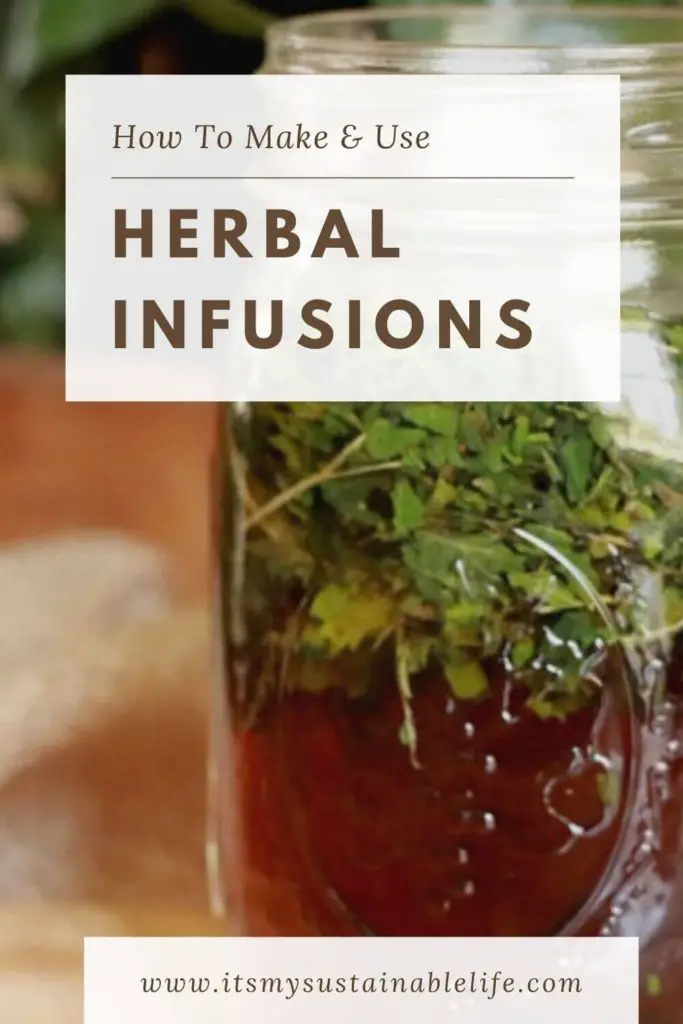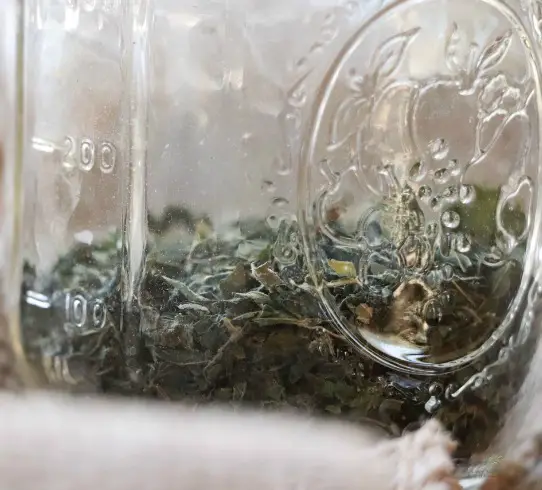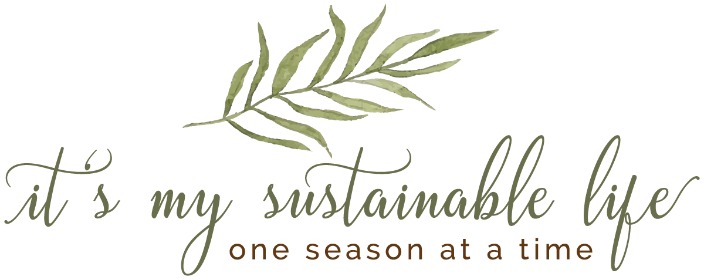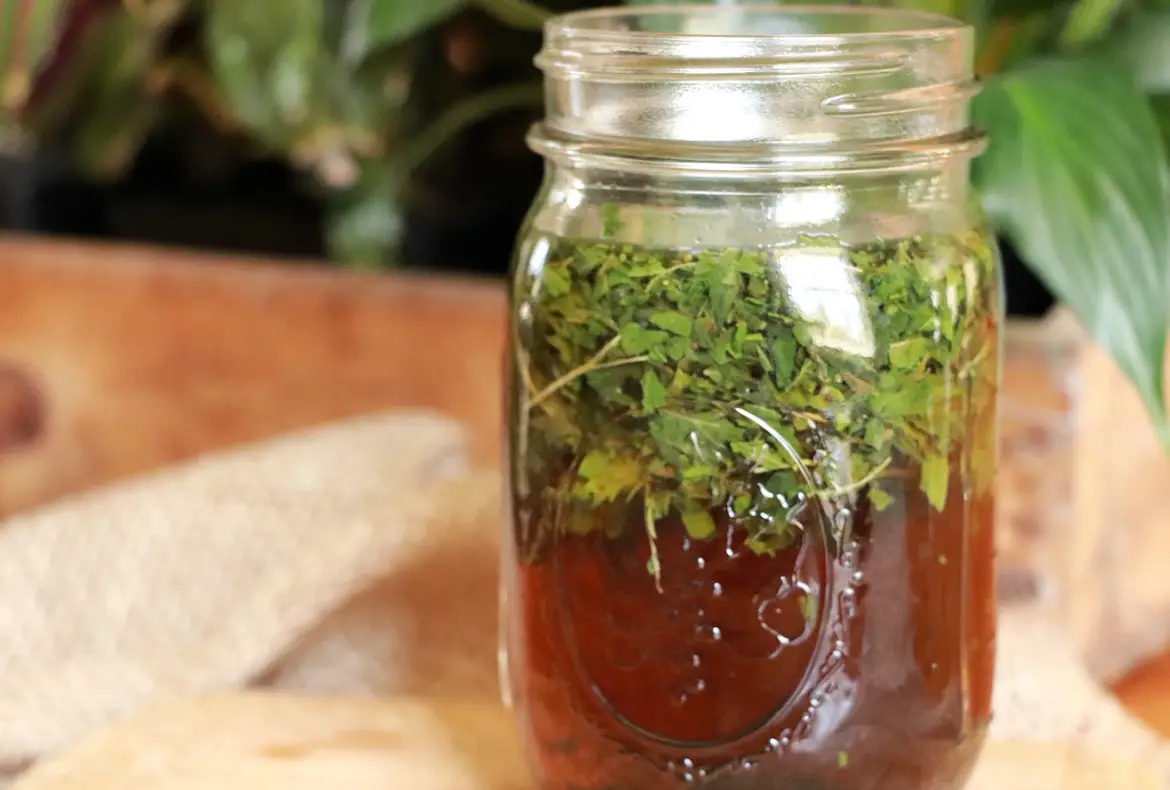Herbal Infusions have been utilized medicinally to treat many ailments for thousands of years. Creating herbal infusions by infusing oils, water, and even vinegar with nourishing herbs releases the herbs deep healing properties, making them readily available for use.
This post may contain affiliate links at no additional cost to you. By making your purchases through the links on this website, IMSL may make a small percentage at no direct cost to you. IMSL only promotes products we use & truly believe in. Please refer to my Privacy & Disclosures for further information. IMSL thanks you for your support!
Learning to harness herbs medicinal & nutritive qualities has long been a favorite “hobby” here on the hill. Whether making and using our own tinctures {think St Johnswort, Valerian, Motherwort, & Elderberry}, infusing oils for salves & balms {think dandelion & calendula}, or simply drying the herbs for long-term storage {think basil here}, we love to utilize all the healing properties offered by our favorite herbs. And that includes infusing them.
WHAT IS AN HERBAL INFUSION
Herbal infusions {uses large amount of leaves, stems, & flowers}, commonly referred to as decoctions {typically uses roots, bark, & seeds}, are one of our most revered methods to use herbs as a restorative {bringing the body back into balance} as well as for medicinal purposes.
Herbal infusions, aka “long infusions”, are made using large amounts of herbs steeped in hot water for, you got it, long periods of time. Typically steeped for 6-8 hours or more. This deep infusion allows for optimal nutrient content according to Rosemary Gladstar.
One of our favorites to infuse are Nettles, due to their high nutrient content, antioxidant, & anti-inflammatory properties. Earths healing gifts at it’s finest.
THE DIFFERENCE BETWEEN AN HERBAL INFUSION & TEA
Although both are considered infusions, there are differences. As stated, an infusion utilizes large amounts of herb and steeped a long period of time. Tea, however, typically using just the leaves of the plant, utilizes smaller amounts of the herb and are steeped for a much shorter time period.
IS AN HERBAL INFUSION THE SAME AS A TISANE
While tea is typically made using just the leaves of one plant {true tea is from Camellia Sinensis, a native shrub in Asia}, a tisane or herbal tea {not actually a tea at all}, especially when medicinal, are infusions that utilize many parts of the plant. Root, bark, stems, & leaves are all used in tisanes.
ARE HERBAL INFUSIONS HEALTHY
In a nutshell, YES! In addition to the healthy dose of nutrients & medicinal properties that vary according to the herb of choice, infusions can also help to reduce stress {think Peppermint, Chamomile, Lemon Balm, & even Passion Flower}, help improve the immune system {think Dandelion, Ginseng, and Licorice}, and help reduce pain & soreness {think Turmeric, and Feverfew} to name just a few.

HOW TO MAKE A NOURISHING HERBAL INFUSION
Making a deeply nourishing herbal infusion is easy. We prefer to use a hot herbal infusion method as we feel this draws out the herbs enzymes, vitamins, & oils much more effectively. This is the method we utilize & feel works best.
- Add 1 oz of dried herb {approximately 1 cup} and place into a mason jar or container of choice
- Place the jar on hot pad or cutting board as it will get hot
- Cover the herb with hot water & seal
- Allow the mixture to steep for 4-10 hours. We typically make this before bedtime and allow to steep overnight
- Strain through a fine mesh sieve, cheesecloth {good for squeezing all that goodness out}, or tea strainer
- Cover infusion, we like to store in refrigerator
HOW LONG DO HERBAL INFUSIONS LAST
Herbal infusions are not long lasting. We typically like to use our infusions within 3-4 days but depending on the herb used, some may last up to a week. We have found they last a bit longer by storing in the refrigerator.
Can’t drink or use the entire infusion within that time frame? Don’t throw it away! Use to water your houseplants {they will thank you}, add to a restorative bath, add to your furry friends or homestead animals water {depending on herb used of course}, or water your outdoor garden!
HERB SUGGESTIONS FOR HERBAL INFUSIONS
Where to begin? There are so many beneficial herbs to choose from. We recommend you research thoroughly the herb of choice, both it’s benefits as well as cautions and contraindications prior to making & using.
Not all herbs are created equal. Highly aromatic herbs such as parsley, chervil, chives, rosemary, mints, basil {to name just a few}, are NOT recommended for use in long infusions. Some herbs, such as the ones listed, will become bitter and unpalatable if used in long brews. These types of herbs are powerful in their natural state. Think of it as nature informing you it may be too much of a good thing 🙂

Here are a few of our favorites we enjoy…
STINGING NETTLE LEAF – This may be our favorite to make & use. This highly beneficial herb is the king of infusions in our humble opinion. It’s benefits tout the following nourishing benefits …
- Improves & strengthens adrenal systems
- Allieves & assists with cystitis, bloat, & incontinence
- Helps with arthritis, gout, & joint pain
- Improves endocrine glands
- Relieves constipation & hemorrhoids
- Nourishes skin & healthy hair
- Improves stamina; reduces fatigue
- Strengthens the nervous system
- Eases hay fever
OAT STRAW – We often use oat straw & stinging nettle together as an infusion. Oat straw boasts of the following benefits …
- Boasts high mineral content
- Strengthens the nervous system
- Nourishes the pancreas & liver functions
- Improves digestion
- Improves circulatory systems
- Great source of calcium
DANDELION LEAF – Dandelion may be one of our favorites to use for so many purposes. As an infusions the benefits are many.
- Relieves constipation
- High in mineral content
- Diuretic {flushes kidneys}
- Contains potent antioxidants
- Anti-inflammatory properties
- Liver support/increases bile production
These are just 3 of the favorites used here on the hill. Other options include red clover leaf {high in protein and vitamins & also containing anit-inflammatory properties}, linden {great for colds & flu, antispasmodic, & sinus pain}, and mullein {lung issues, anti-inflammatory properties}.
Again, due your due diligence when selecting herbs to infuse. Research, ask questions, and be mindful. These are potent medicinals and should be taken seriously.
There may be nothing finer than what nature has provided us to support & promote health, and even cure in some intances, disease & ailments. Learning to harness all that potent “medicine” and use it to our advantage is a quest we have been on for many years.
It’s also not a difficult “quest”. It’s one that’s readily available to all. Do you already infuse your herbs? What are your favorites to use? What do you use them for? Join our conversation below. We love to hear from you! And in the meantime, enjoy those herbal bennies 🙂
Love, Light, & Laughter ~



44 comments
This is really cool. I loved learning the difference between herbal infusions and tea. Thanks for clarifying!
This is very interesting! There is so much I don’t know. I would assume it would be ideal to have these plants growing in your garden, most of them I’ve never heard of! Very fascinating!
Congratulations! Your post was my feature pick at #OverTheMoon this week. Each Hostess displays their own features so be sure to visit me on Sunday evening and to see your feature! I invite you to leave more links to be shared and commented upon. Please don’t forget to add your link numbers or post title so we can be sure to visit!
Thank you so much for the feature, Marilyn!
Thank you for sharing at #OverTheMoon. Pinned and shared. Have a lovely week. I hope to see you at next week’s party too! Please stay safe and healthy. Come party with us at Over The Moon! Catapult your content Over The Moon! @marilyn_lesniak @EclecticRedBarn
What a beautiful post🙌🏻
I live infusions. They are so beneficial and easy to make.
Thank you very much for all this info,it´s really interesting. I´ve been attending a “Plant Experimental” workshop in my town, and we have made infusions in water or oil from different plants. We have even made a pie with nettle and other local, green leaves, it was incredible! I´m very happy because I´ve learned to make my own salves and cleaning products and I see that little by little we are adopting a more natural way of living. I live in the central part of Argentina and there are some different plants from where you live but I guess the feeling for a better life is the same! Congrats on your work!
What an interesting workshop that must have been! Thank you for reading all the way from Argentina!
Wow, this is really interesting. Glad to read about this
Thanks for sharing this with us at the Homestead Blog Hop, your post has been chosen as one of our features this week!
Another informative Suzan! I always learning something new. I’ve never heard of herbal infusions even the stinging nettle leaf. We have plenty of dandelions here so I might have to try it.
Excellent information and never knew the difference between the infusions vs tea.
I love these suggestions. I have really become curious about more natural methods for dealing with common issues. I’ll have to reference these and do some more research.
Love that you will be doing more research. I encourage it and applaud it! Let me know if you have any questions we can help with. Thank you for reading & doing your due diligence!
Wow so much great info, who knew? I grow them, cook with them, but never infused them.
As always, really great information!
Excellent info! I love all things herbal, including infusions. Nettle leaf is a wonderful one indeed as is dandelion.
I love this so much. I’ve always been interested in the “old” ways. I’m growing herbs for the first time this year and will be sure to try this!
This is so interesting! Thanks for sharing 🙂
So much great information! I’ve always been curious about trying STINGING NETTLE LEAF and DANDELION LEAF infusions.
I have so many dandelions…I can wait to try this recipe! Thank you so much!
LOL! Don’t we all. They are amazing non-weeds!
Again I am so intrigued by your information. Though I have not made my own, I have had dandelion tea for the diuretic and anti-inflammatory benefit and it works. I am a believer. Never thought about making my own though. Thanks.
Thanks for sharing. I have never infused anything but maybe I will try!
This is great information. My husband suffers from gout. I may have to try to make some infusion for him. Thank you for sharing.
This is a lot of great info! Looks like it would be fun to try.
This is a great skill to have! It is something I definitely need to learn.
This is so interesting. I’d never thought of making an herbal infusion before, though we don’t drink tea and this would be a great healthy substitute.
Great and informative post! Thanks for including the recommended herbs to use.
I can see that so many of these infusions would be very helpful!
You made a very valuable point. Herb choice should be taken very seriously!
We have a huge herb garden and I’m so excited for more of it to start growing! Winter has gone on long enough and we just don’t have enough room inside to grow year round yet.
We all need to really get back to nature, we’d be a lot healthier I think.
I love reading about your knowledge – can’t we live a little closer so that I can have direct access to you and all of your incredible concoctions? My family would greatly benefit from it 😉
Sure! I think we have land near us for sale!!
This is really interesting. My mom is going through chemo and some of these could definitely help her. I always imagine myself doing things like this and making all the things you post, but I never seem to. I’m not sure what’s holding me back, except that I’ve never been one to do anything from scratch unless it’s baking. One day I’ll make your elderberry syrup!
Give it a go & see how easy it is! Thanks for reading, Laura!!
Yum! Thanks for sharing these great tips! Linden is also fantastic for getting more restful sleep, at least in my experience.
I’m looking to dive deeper into infusions this year and this post really helped. Thanks!
I’ve just started a very small herb garden in my back garden. I’m in Massachusetts so it’s still quite early. In fact, we had a few snow showers this morning.
Thank you for all of this good information! We can buy dried dandelion leaves in the store. I am going to try to make an infusion this week. I need something with anti-inflammatory properties.
I want to add this to my infused water. Can I use fresh herbs?
Have a safe and healthy spring,
Kippi
Hi Kippi~
You can, however, be aware that by using the herbs fresh, the moisture content of them may cause the infusion to mold or go bad very quickly. Hope that helps. Let me know if you have any further questions!
Stay Safe & Be Well,
Suzan